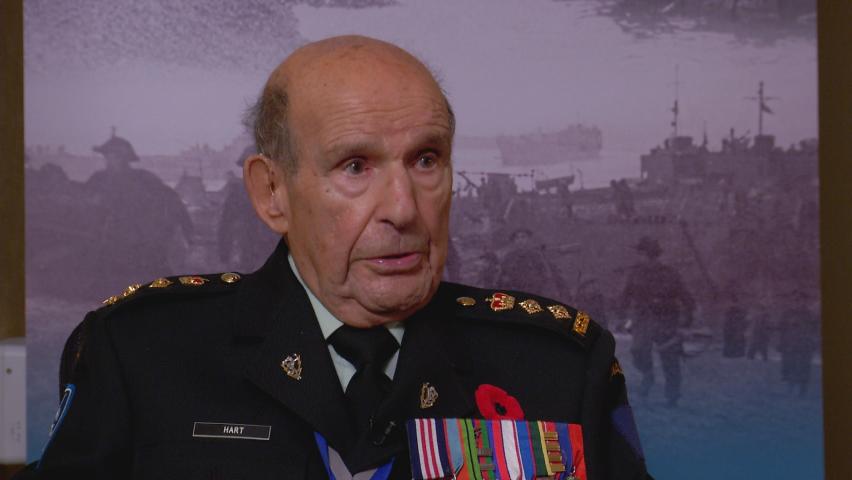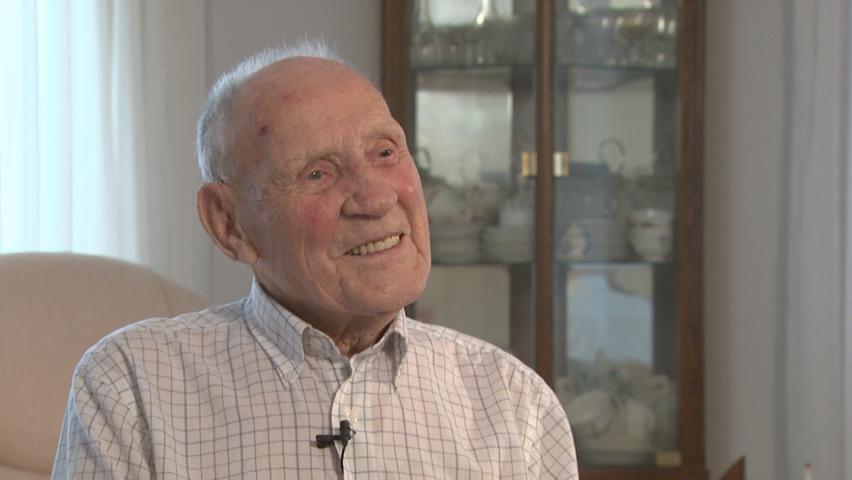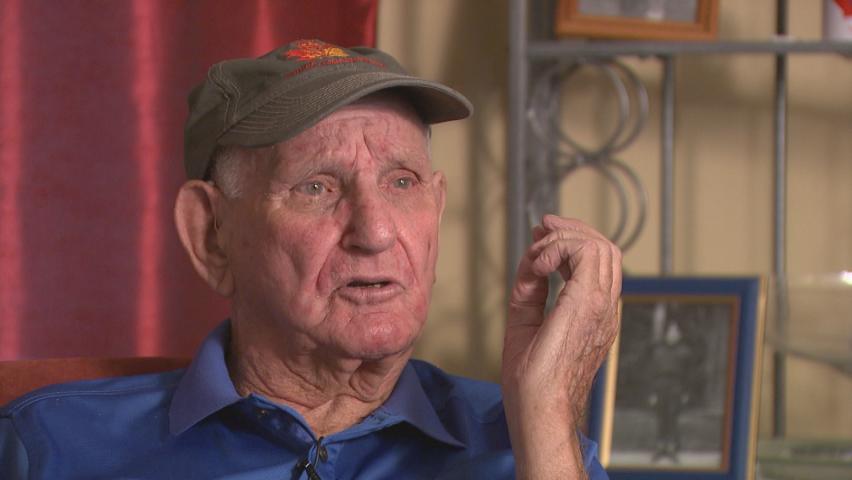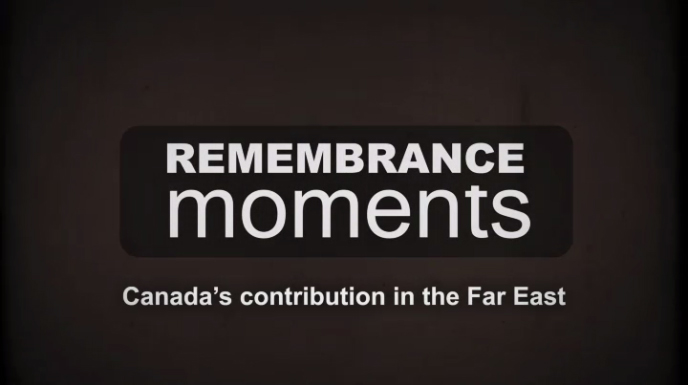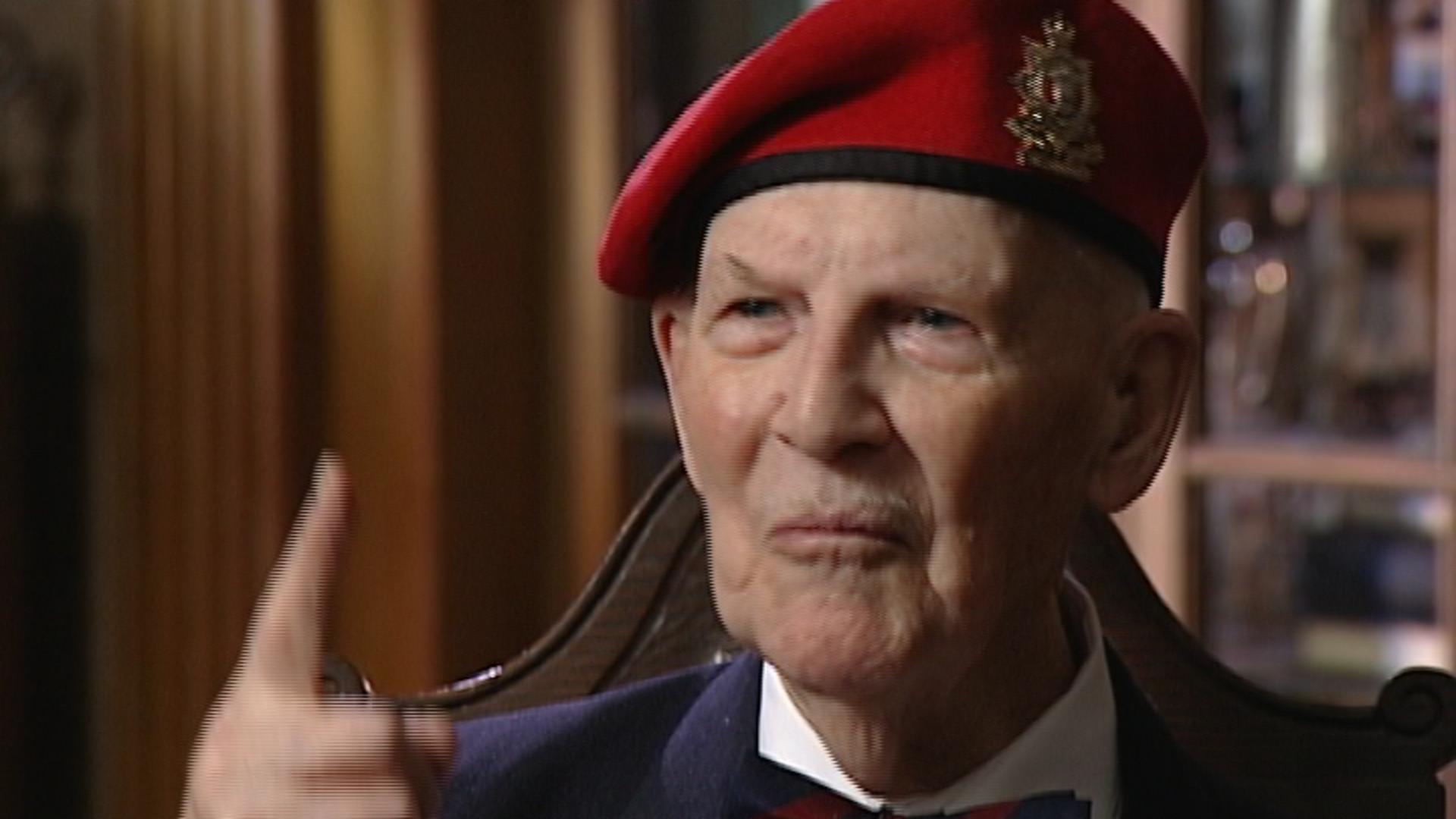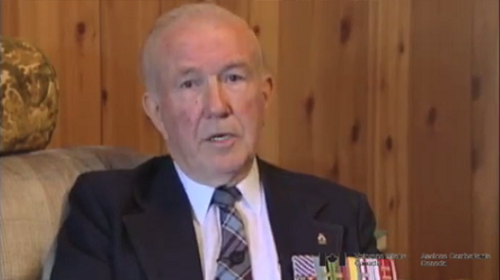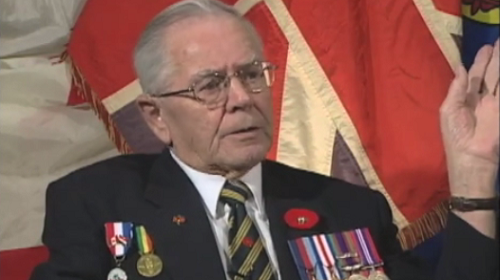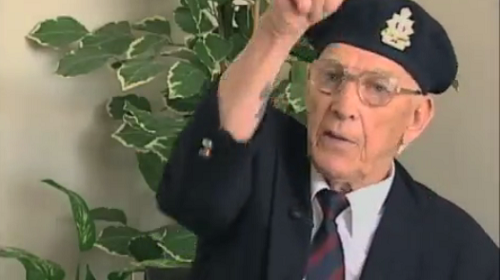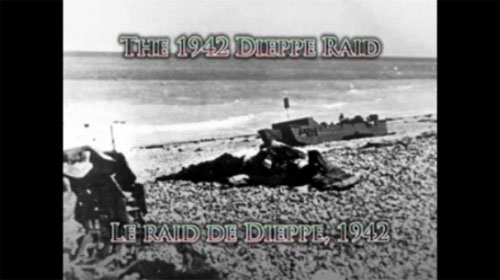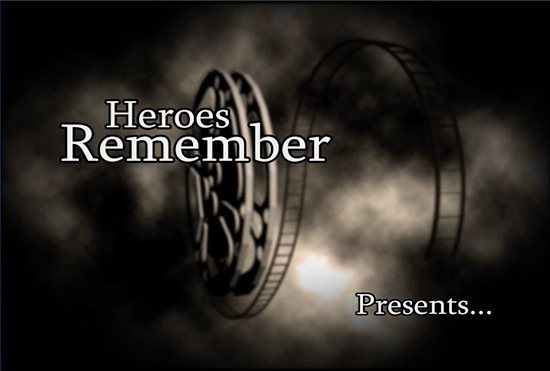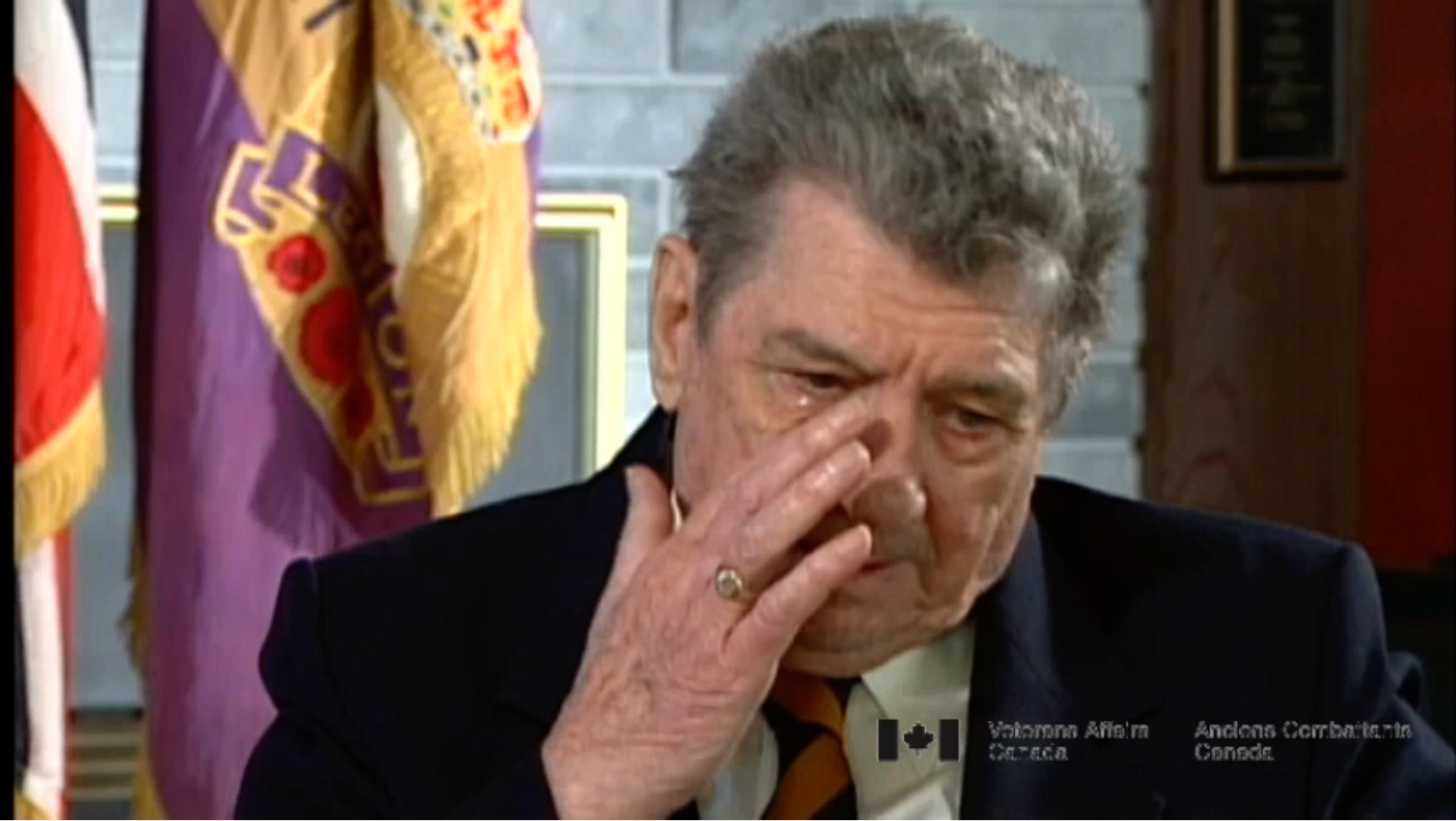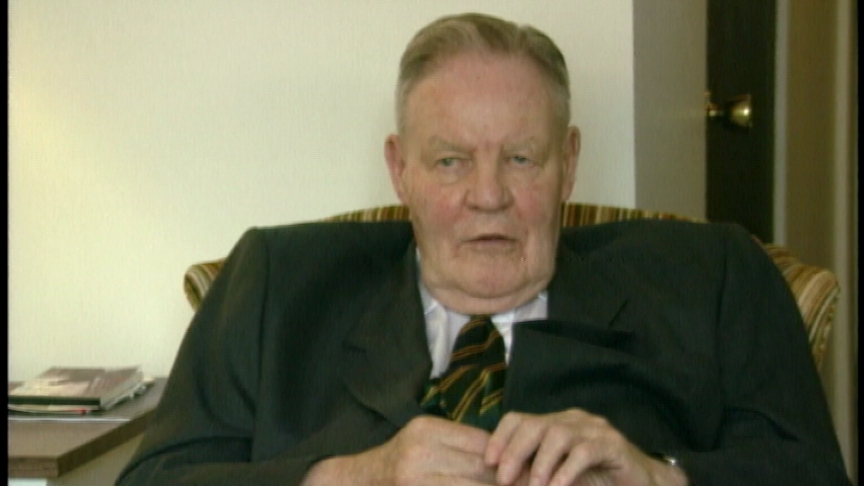Treating Severe Burns Victims
Heroes Remember
Treating Severe Burns Victims
Transcript
I walked in and, sort of, you, you learn to control your feelings
and poker face. I walked in and saw this first kid no nose, no
mouth, no lids. I, I wanted to cry, but I stopped and talked to
him and he said, "What's your name?" and I said, "Nursing Sister
Empie." He said, "No, What's your first name?" I said, "Well
we don't know each other well enough, wait til we get to know
each other better" and I said, "How are you feeling?" "Well," he
said, "I'm oh, hands, I don't feel anything." His hands were,
fingers were off. And what they did was slit up into the hand,
and this is what they had and it was just when they pinched you,
it was just like a vice. When I turned to go, he pinched me.
Tears came to my eyes. It was a dreadful feeling. Turned around,
I lost my cool and I said, "Next time you do that I'll punch you
in the nose." "I ain't got one." He didn't. I said, "I can wait"
You know forty years later when they had the reunion here, all
the, all the, the RAF that was in our wing, they had to call
themselves limy Canadian before we'd let them into the party.
That's mean. But they'd come over and they'd enjoy it. Forty
years later I said, "Well, Wes, Les you've got a nose now. You
better behave yourself." He laughed. See this is their, these
people had scars on their face, but also on their body. Our
biggest job wasn't taking out sutures or putting bandages, it
was to get them out. The psychological scars were deeper
than their... Our biggest job was to get them out to the town, to
the pub. This is East Grinstead, known as the, the little town
with the big heart. They were just wonderful to these, these,
kids that were... They were kids, they were late teens early
twenties, and no matter where you went the public and was, at
the white hall. They could go in there any time, we'd go in
there any time, raise cane and he just took it all.
There were two people from the British Embassy or somewhere, its,
you know all dressed up in tie, suit and tie, came in, and they
looked around and they ordered a beer looked around he said, said
to Bill, "How, how on earth can you stand these people around?"
He said, "I can stand them fine, I can't stand you" and he
threw their money and told them to get out. This one, like I was
saying, the one we, we had to massage the finger, 10 o'clock we
got all cleaned up and, and a great big bandage like a big
boxing glove. And I got home and the matron, matron phoned
said, "Where's Novel?" I said, "Well, we left him, we fixed
up his hand and left him in bed." "He's not there," so she
says, "Well, the, the car's gone out, well you better go find
him." And the guy started in one pub, it was after ten and pubs
are closed, he started one pub and he put the bandage around one
doorknob and all the way. We finally found him at the -- of
course there's a lot of pubs -- at the last pub, and his, the
bandage was gone. I picked him up, took him back and we had to
do his hand again. And we went to do his hand, he wasn't there,
he was, he was, he was you know, underneath, running away
underneath these partitions. There was about that much space
under he was scooting under and there we were trying to catch
him. I couldn't, I didn't get under the, the partition, but the
other girl was little and she was chasing, she'd get under there
and he'd be under there, they went... Finally one of the
orderlies caught him at the end. Took him back and we told him if
he moved again we'd tie him up so we put the bandage on and
able to save this... See, if he had the two fingers he could do
anything. If he had just a thumb he couldn't, so this is why we
didn't mind spending the extra time trying to save his finger.
Everybody worked together, nobody complained. The only thing
is we didn't have any escorts. We were only the 71 batch of two,
two bachelors there and they, they were, all had girlfriends, so
we just went out to the parties in a group, had a good time and
looked after the guys, made sure that they had fun, pulled
them out of the corners. This one guy had no lips and he had to
drink his liquor out of a straw. He was standing in the corner
with a drink. The, Sterns, the whisky people, lived in East
Grinstead and we traded one case of rum for one case of coke,
so we had parties, 'cause they, you couldn't get coke there
and this guy was standing there with rum and coke, drinking
through a straw. And they, this is how they managed, they found
ways to get over it, which they did.
To have all these people dying for what? Nothing, nothing
accomplished. It's just sad. I was so happy to have the, all
these guinea pigs come to Victoria to see something that worked
out well and they made it. It was these, the, the psychologic,
inner scars were worse than their outer scars and that's what we
had to... Our big job was to get them out and to the pubs and we
had to make sure they'd come in, go find them, but that was great
They got out and they got used to being out and I say that people
in East Grinstead were marvellous, just wonderful. They
had them out to their homes, and, it, it was just wonderful.
Those few months in East Grinstead stand out in my mind.
They affected me more than anything else, and we had Czechs,
we had Poles, we had a Belgian, and Australians, any, anybody in
Britain. At, at the first reunion here, forty years... 'Course
there's always a nurse-patient relationship but here we were
more... they'd hug us. They wouldn't let us go. This one
young, youngster's about nine, 18 and he, we had three little
boys, that had, civilian boys that had been burnt badly. They
found a bullet or something and hit it with a hammer, so they
were in there to remove the scar tissue and he got these little
guys to push his wheelchair and chase me around, chase me around
the hospital so at this meeting here for first time.
I was standing talking to some people, all of a sudden somebody
grabs me, "Got you." He finally got and the matron of course
she, she didn't show up to the meetings until just recently and
of course they hugged her. She couldn't, she, you're not longer
the boss, we're gonna hug you and we're gonna kiss you, oh dear.
They, in Winnipeg they, at Regina in '88 they had a bunch of
them sitting down there and one of them had a camera, "Come on,
come on we got you, you're gonna kiss everybody and we're gonna
take the picture." So I had to kiss the whole works, and you
know some of the people sitting there were, you know, it's, it's
skin, it's flesh but this. They had this terrific, dinner at the
Regina, at the United Services club, and they had the head of
the RCMP, RCMP school, the... All the money went to the burn
unit at the Regina and they had the chief burn doctor who is a
Chinese and all these important people from the city and the one
sitting across from us, we had a mess dinner, 7 courses, wine.
I had to cover my wine. I don't drink, glass, he poured one.
I had to keep it covered, but everybody else was.
The guy across from me, he said, "You people know, what you
people did is, is unbelievable." He was crying in his drinks.
Yeah, he just couldn't believe it. He said, "I, I couldn't
imagine anybody doing what you people did," and of course they
were looking at these guys that, they're still, you, I mean they
they didn't look really normal, you know the camera doesn't show
all these little scars and, and but it was... I mean as I say,
that was the highlight of my career.
Description
Ms. Moore describes her arrival at a Canadian Army Hospital in East Grimstead, England.
Hilda Moore
Hilda Moore was born in Germany on February 2, 1917 and immigrated to Canada with her family in 1925. She served as a Nursing Sister during the Second World War, mainly in a Canadian military hospital in East Grimstead, England. That hospital specialized in treating victims of severe burns. They referred to themselves as the Guinea Pigs in light of the then-experimental methods of treatment they received. The interview was recorded on June 7, 1997 in Victoria, British Columbia.
Meta Data
- Medium:
- Video
- Owner:
- Veterans Affairs Canada
- Duration:
- 09:23
- Person Interviewed:
- Hilda Moore
- War, Conflict or Mission:
- Second World War
- Battle/Campaign:
- D-Day
- Branch:
- Army
- Occupation:
- Nursing Sister
Related Videos
- Date modified:



